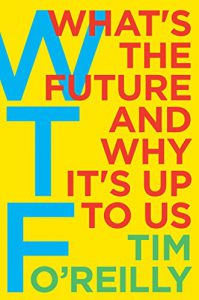WTF?: What’s the Future and Why It’s Up to Us. Tim O’Reilly
Tim O’Reilly has had a backstage pass to the technology change we have been coping with for the past three decades. WTF is his effort to make sense of what he’s seen and offer some counsel about what it may mean for the next decades we’ll be living through. While some cynics and skeptics might view this as no more than O’Reilly’s attempt to hit the speaker’s circuit, there’s value here to those of us with a more restrictive view of the show. Can O’Reilly offer the rest of us valuable insights even if he may have been mostly a combination groupie/roadie for the more visible performers on the stage? My assessment? This is one smart roadie with insights worth paying attention to.
What makes WTF work is that O’Reilly is an unusual blend of techie, communicator, and entrepreneur. In ethnographic terms, he’s been a participant/observer throughout this unfolding process. Most of those reporting from the new territories are one or the other; they are participants either too busy or too biased to offer dispassionate analysis or they are observers too removed from the action to see the really interesting stuff.
One of the early battles was between open vs proprietary strategies. Eric Raymond labeled this as a choice between the Cathedral and the Bazaar. Today it is evolving into the emergence of networked platforms as one of the next arenas being contested. O’Reilly frames this continuing evolution as a requirement to differentiate between value creation and value capture. Organizations that focus on capturing all the value that they create do not prosper as abundantly as those who focus principally on value creation. Those who focus on playing positive-sum games do better—both for themselves and for the rest of us—than those who choose to play zero-sum games. This is a countercultural if not a counterintuitive strategy. The rhetoric of Wall Street and VCs is anchored in a zero-sum mentality; the winners in this new world, however, are playing a deeper game.
What I find especially intriguing about this line of thought is how it makes strategy and organizational design tightly coupled and how it then shrinks the differences between how things work inside the organization and how they work outside. One of the curiosities of large, traditional, organizations is that they cling to the worst practices of centrally planned and managed economies internally as they celebrate the value of the free market outside their walls.
At heart, what O’Reilly is arguing in WTF is not only that this is a hypocritical debate but that it has become a dangerous mindset as well. As he puts it “Amazon Web Services was the answer to a problem in organizational design.” O’Reilly reports on an interview with Jeff Bezos talking through the origins of AWS;
“Four years ago is when it started, and we had enough complexity inside Amazon that we were finding we were spending too much time on fine-grained coordination between our network engineering groups and our applications programming groups. Basically what we decided to do is build a [set of APIs] between those two layers so that you could just do coarse-grained coordination between those two groups.â€
Working through this logic is anything but intuitive. Learning how to do so consistently may be the central skill for thriving, or possibly even surviving, in what is to come. O’Reilly has come in for some criticism in his perspective on Uber and its evolving working relationships with its drivers. I think the criticism is overblown and misses the nuance that O’Reilly is attempting to call attention to.
This goes to the heart of what WTF tries to do. Looking at a sample of successes, failures, and yet to be determined experiments, O’Reilly is trying to understand the strategic logic of the world we are brining into existence in a way that would let more of us contribute to that logic. I’m less interested in whether he has worked out the answers than I am in learning how to think along similar lines.
